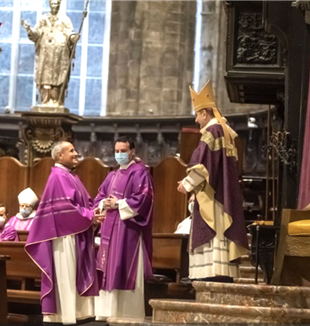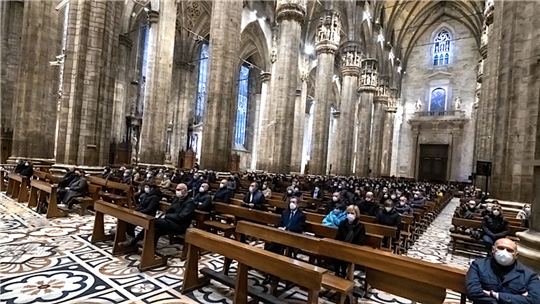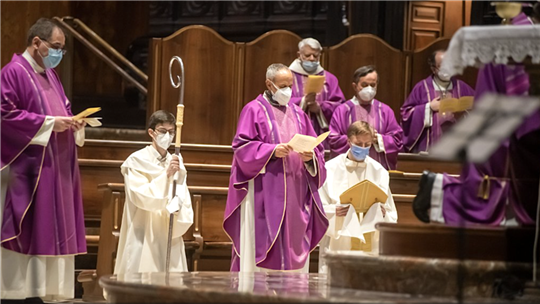
Fr. Giussani’s anniversary, the words of Delpini and Carrón
The Archbishop of Milan’s homily in Milan Cathedral for the sixteenth anniversary of Fr. Giussani’s death, and Fr. Carrón’s greeting.1. Not a possession, but a promise.
To people who have stopped, God says: go forth! To those who cling to what they possess in order to overcome their fears and uncertainties, God says: trust! To those who find boundaries reassuring to make themselves inaccessible, God says: go out!
There is, in fact, an effort, a resistance, perhaps even fear, a dark anguish in leaning towards the future and there is the temptation to find relief in settling in the present.
Therefore, instead of time, space; instead of the path to be undertaken, the land to be possessed; instead of being on the path, the illusion of having arrived; instead of the destination, you are attracted by the parking; instead of the question that disturbs, the commonplace triviality that feeds the presumption of being right just because we repeat what everyone says. Even in relationships between people, the instinct of possession undermines the freedom of love. Instead of freedom to be guarded, the person becomes an object to be desired; affections, instead of being encouragement to give, become the excitement of pleasure; others, instead of being brothers and sisters to be served with wonder and gratitude, are treated as resources to be used with petty obtuseness and opaque indifference.
2. I will guide you in the way of wisdom.
The word of wisdom, through wise and reliable witnesses, continues to be an invitation, a reminder, a reproach, a proposal: I will guide you in the way of wisdom ...the path of the righteous is like the light of dawn, which shines brighter and brighter until full day (Prv 4:11,18).
Wisdom is therefore a path, rather than a doctrine, it is a dawn that allows us to see the steps to be taken: wisdom reveals that we are free people who cannot avoid the responsibility of choosing the future, of living time not as the immobile present, but as the condition for responding to the Lord who calls.
"Time is greater than space," according to the teaching of Pope Francis (EG 222- 225). The word that was addressed to Abraham offers some insights into a "spirituality of the pilgrim."
The pilgrim is a wayfarer: he does not think he has a permanent dwelling somewhere on earth. He does not occupy a space; he is rather on a journey. He knows that he is a guest and a pilgrim, rather than master and lord. He considers every land a place where he can stay and at the same time he knows that in every land he is a stranger. Therefore, he lives in freedom: like Abraham, he carries with him all the goods he had acquired in Carran and all the people he had procured there, but he knows that his life does not depend on his goods.
The pilgrim is a wayfarer, but he is not a wanderer, he does not walk aimlessly. He obeys a word that guides him without offering guarantees, asking only for trust. The pilgrim does not walk without criteria: he distinguishes between the way of the wicked and the way of the righteous.
The pilgrim is an inhabitant of time, not of space: he knows why he left, he knows what promise he believed, but he knows that the journey will give an unpredictable shape to his freedom, his affections, his culture; he knows that time will write not only the wrinkles on his skin, but the new name by which he will be called on the last day.
The pilgrim walks together with many, he belongs to a people, to an escort, but he knows that no one can replace him in responding to the voice that calls him; belonging to the escort is not a costume behind which to disguise oneself, but the responsibility to take care of everyone and not to allow anyone to be left behind.
The pilgrim continues his journey to his destination: his whole journey would have no meaning if he stopped before reaching the place where the Lord is waiting for him. Therefore, for him, what he encounters along his journey is never a sufficient reason to stay behind: rather, it is always the grace of recognizing a sign, an invitation to go further, a word that opens up horizons.
3. The legacy of Father Giussani.
The remembrance of Fr. Giussani is also the occasion to listen with him to the word that the Lord addresses to us today. His charism is at the beginning of a Movement; his personality, his writings are a gift for the whole Church. They become a footprint to follow: to be on the move according to the spirituality of the pilgrim. Read his writings to find in them light for the journey and find in them the echo of the word of God: Go forth! Beyond! Towards the land that I will show you.
The final greeting of Fr. Julián Carrón, president of the Fraternity of Communion and Liberation, to Archbishop Mario Delpini at the end of the celebration
Most Reverend Excellency.
I would like to express my deepest gratitude on behalf of myself, all those present, and all the friends who participated in this celebration in the Duomo, on the occasion of the sixteenth anniversary of Fr. Giussani's birth in Heaven and the thirty-ninth anniversary of the Pontifical Recognition of the Fraternity of Communion and Liberation.
In the difficult situation that we all find ourselves living, his availability and his words are for us a sign of that secure and cordial paternity that is a reflection of the gaze with which God, in His mercy, accompanies our journey.
The time that has passed since Fr. Giussani's death makes us ever more grateful and aware of the gift we received by encountering him and thus being able to participate in the charism given to him by the Spirit.
In daily personal and social events, although often marked by hard trials and by the hardships and uncertainties we all share, in the participation in the life of the Church, it is increasingly evident to us that the charism received is not just for our benefit, as a sort of privilege, but it is totally for the benefit and at the service of the Christian people led by its pastors, together with and under the guidance of Pope Francis to whom we give our filial devotion.
Well aware of our limits and our poverty, we give back into your hands, Your Excellency dearest, our determination to serve the mission of this Ambrosian Church, in the bosom of which, from the person of one of its priests, Fr. Giussani, a "particular history" has flourished that today is spread throughout the world. We ask nothing more than to be able to offer our existence to the Lord in fidelity to the Pastors and to that accent of the Spirit of Christ that has fascinated us and continues to fascinate us and thus continually opens us to the totality of the life of the Church in the events of the world, in the solicitude of witness and charity at the service of our brothers and sisters.
Thank you, Excellency!